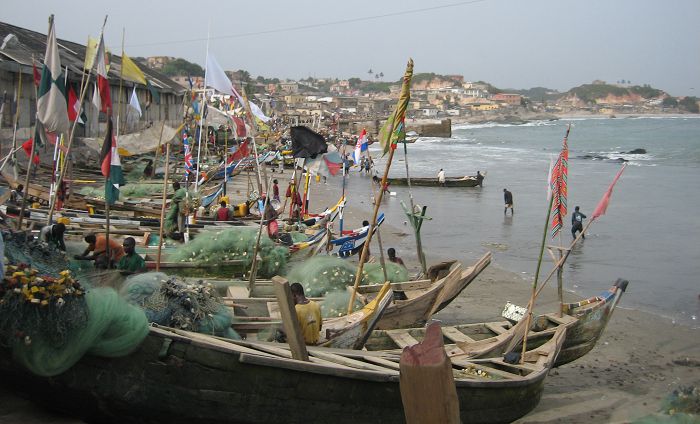
Youth run from fishing
An assessment of the country’s marine and fisheries industry has indicated that the sector is facing demographic challenges as only a few youth are opting to work there.
The demographic crunch, according to fisheries experts from the University of Ghana and the University of Cape Coast, is impacting negatively on the sector which was already experiencing many challenges.
Advertisement
This was the highlight of a dissemination workshop to share the findings of a research which covered 23 landing sites across four coastal districts in the Greater Accra and Volta regions. There are 310 fish landing sites across Ghana's coast.
Sharing the findings yesterday, the Chief Executive Officer (CEO) of the research organisation, Benda Services Group, Mr Ben Edusah, said the study revealed that the current workforce along the coast was an aging population, with most of the fishermen, fishmongers and fish processors aged between 35 and 60.
The fisheries sector employs about
2.4 million individuals, representing about 10 per cent of the population, and generates revenue of $341 million annually “yet we found that the youth are not interested,” Mr Edusah said.
He explained that most of them did not want to venture into fishing or fishmongering because they claimed the sector was not lucrative and had a lot of challenges such as the declining fish catches, stressing that “less and less young people want to go into fishing."
Mr Edusah stated that the shrinking labour force would have negative consequences on the fisheries sector and urged that measures be put in place to address the issue.
He said the few youth from the coastal areas who pursued higher education "want to be employed by the Ministry of Fisheries and Aquaculture Development and other organisations in the fisheries sector instead of going to sea or processing fish. They prefer engaging in office jobs instead of field activities."
Stakeholders from the fisheries sector including fishermen, fish processors, fishmongers, representatives of the Ghana National Canoe Fishermen Council, the National Association of Fish Processors and Traders; the Ministry of Fisheries and Aquaculture Development, academia and journalists attended the workshop.
Way forward
The researcher pointed out that some of the interventions that could promote youth engagement in the fisheries sector included direct government support, including the provision of incentives such as input supplies, policies and sensitisation to encourage the youth to venture into fishing.
“It is important for the youth to engage in the fisheries sector to ensure knowledge transfer across generations that will promote a sustainable supply of aquatic resources,” Mr Edusah said.
Constraints of women
The study, he said, also established that women’s participation in decision making in the fishing communities was low as a result of some cultural and traditional perceptions and their low level of education.
Other constraints of women in the sector include lack of access to credit facilities to expand their businesses and exposure to smoke and heat-related illnesses, among others.
Fisheries governance
Again, the key constraints to fisheries governance and coastal management at the local level, the research established, included illegal fishing practices, lack of gazetted bye-laws to enable the local authority to enforce compliance, political interference, high cost of fishing logistics, inadequate supply of premixed fuel, poor sanitation and lack of alternative livelihoods for the fisherfolk.
Purpose of study
The project is part of a five-year United States Agency for International Development (USAID) sponsored programme under its Feed the Future (FTF) Initiative to promote fisheries and coastal management in Ghana.
The project is led by the Department of Fisheries and Aquatic Sciences (DFAS) of the University of Cape Coast (UCC) in support of the government's initiatives on food security.
In line with the project, a private consultancy firm, Benda Services Group (BSG), was commissioned to conduct research and assessment of the country's marine and fisheries governance issues.
An Associate Professor at the Marine and Fisheries Sciences Department, University of Ghana, Professor Francis Kofi Ewusie Nunoo, said the purpose of the study was to provide documented scientific information for advocacy to improve fisheries practices and facilitate the decentralisation of the fisheries management process.
Additionally, he said it was to identify districts and community level constraints and opportunities in the governance and management of fisheries and coastal resources.



